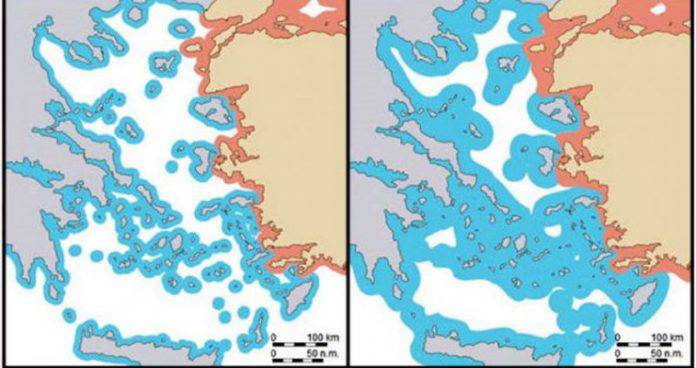Stavros Lygeros: Dendias in the footsteps of Kotzias – 12 Mile Territorial Waters: Rule or exception?
25/08/2020
Yesterday in the Hellenic Parliament, Foreign Minister Dendias announced the expansion of Greek territorial waters in the Ionian from six to 12 (nautical) miles. The idea is not new. Leaving the Ministry of Foreign Affairs (October 2018), then minister Kotzias had referred to his decision to extend the territorial waters from Othonios (north of Corfu) to Antikythera.
Kotzias had stated his intentions during an interview with ERT in December 2017. However, until he left the Ministry of Foreign Affairs, he had not taken the relevant step. Neither his successor Katrougalos, nor Dendias did so. Greece pays dearly for the timeless inaction of its governments in recent decades on this issue.
According to the Law of the Sea, each coastal state has the right to unilaterally extend its territorial waters up to 12 miles. If Greece exercised its right, it would largely nullify Turkish expansionist claims. International waters in the Aegean would be drastically reduced, so a very large part of it would become the Greek sea.
Among other things, the issue of the continental shelf in this area would be practically solved, since relatively small areas (mainly in the northern Aegean and less in the north of Crete) would be left for demarcation. For this reason, the Turks hurried to prevent Athens from exercising its legal right, characterizing the expansion of Greek territorial waters as a cause of war (casus belli).
In June 1995, the Turkish National Assembly authorized the government to take even military measures to prevent this from happening. They were aware that if there was such an extension, they would lose their expansion game in the Aegean. At the same time, the Greek position in the Eastern Mediterranean would be significantly strengthened. Athens declares that it retains its full right to expansion and will exercise it whenever it sees fit. This is a sham position. When a right is not exercised for many years, as in our case, it is weakened, its exercise becomes more and more difficult.
Multi-width territorial waters
It should be noted that the governments of Simitis, Costas Karamanlis and George Papandreou, in the context of Greek-Turkish exploratory contacts, have negotiated the extent of Greek territorial waters. This is despite the fact that (according to international law) this is a right that every coastal state exercises unilaterally. That is, it has no obligation to negotiate it with neighboring states.
Many years ago, I wrote: “Since Athens has wrongly chosen to negotiate with Ankara the extent of Greek territorial waters, at least let it negotiate properly. Athens should have from the beginning extended its territorial waters to 12 miles to all areas not adjacent to Turkey and then negotiated with Ankara a compromise on the extent of Greek territorial waters in neighboring areas.
If it had done so, the non-neighboring sea areas would have been out of the negotiations, while now Ankara is asking for no expansion in the eastern Aegean, offering (?) In exchange for accepting the expansion in the Ionian and Libyan seas! In other words, it is offering what Greece can do on its own, without Turkey having the slightest pretext for reaction, since it is not adjacent to these sea areas “. I have repeatedly stated this position in articles since the 1990s and included it in the section “Twelve miles and casus belli” in the book “After Erdogan what?” (April 2013, Patakis publications).
Pretextual position
For years, the prevailing view was that if the territorial waters were extended only for certain areas, it would be as if Greece was admitting that the Aegean is a special sea. Therefore, it would give substance to the Turkish claim that special arrangements should apply. The argument was also invoked by Venizelos to criticize Kotzias. Will he repeat it against Dendias?
The argument would be debatable if Athens had not already accepted the formula of territorial waters of different range by region and was determined to go to 12 miles. Former Foreign Minister Venizelos, in fact, was a minister in governments that negotiated with Ankara, a right that is exercised unilaterally by each state. The Greek governments negotiated it not because they consider the Aegean a special sea, but because they succumbed – without admitting it – to the blackmail of the Turkish casus belli.
This is the reality and does not change through the official rhetoric of Greece that it will expand its territorial waters whenever it sees fit. When Greece is afraid to exercise its right and when it has already negotiated territorial waters of different scope, Venizelos (and others)’s argument is pretentious. The real cause is the phobic syndrome of the Greek political elite, its reluctance to do anything that would bother Ankara and could potentially lead to a crisis.
It should be noted that Turkey has 12 miles of territorial waters along the Black Sea and its southern shores (Eastern Mediterranean). It does not, of course, extend them to the Aegean, because it would not have a significant benefit and mainly because if it expanded it could not prevent Greece from doing the same.
Are 12 miles the rule or the exception?
Greece must extend its territorial waters to 12 miles in the Ionian, southern Peloponnese, Crete, western Aegean, and even Thrace and Macedonia. And it must be generous in establishing freeways in order to curb any international reactions of this nature. If it does not include these areas in the expansion, Athens will have indirectly but clearly accepted that Ankara has a say there as well. On the contrary, if 12-mile territorial waters are secured, any informal negotiation with Ankara would only concern the eastern Aegean. And of course, the possible deal would be somewhere in the middle, at 8-10 miles.
I had repeated the above argument in 2018 in my article “Teritorial waters: A bird in the hand is worth two in the bush, but not only in the Ionian”. In the summer of 2020, however, the conditions are qualitatively different from 2018 and much more so than in 2013. At that time, Ankara had not raised the claims it raises today. The “Blue Homeland” was not yet a state doctrine and Erdogan was much more restrained than he is today.
In other words, if territorial waters had been expanded everywhere (except the eastern Aegean), Ankara would probably have been limited to rhetorical reactions, given that by 2016 Erdogan had been waging civil wars, first with the post-Kemalist regime and after 2013 with the Gulen network. Even after the failed coup (July 2016), Erdogan feared that the Americans might take advantage of a conflict with Greece to overthrow him. His odd relationship with President Trump and his alliance with Russia relieved him of that fear.
Hesitation in the past for territorial waters
Today, if there is an expansion only in the Ionian, which was talked about by Kotzias and repeated by Dendias, the possibility of future expansion in Crete and the western Aegean will be almost zero. On the other hand, if the territories expand everywhere, except the eastern Aegean, at the current juncture, Erdogan will probably send Oruc Reis 8-10 miles from the Greek coast. It will challenge Greece to protect its territorial waters this time and not a potential EEZ, as is happening now south of Kastellorizo. How can Greece protect them? Only by military means, risking war.
The choices are difficult, because the oligarchy of the past has turned a then diplomatically manageable problem into a crucial one today, that could lead to war. Before making a move, Greece should wait for the US presidential election and Biden to take over the presidency, if the polls are confirmed and he is elected.
Greece must expand its territorial waters everywhere, except the eastern Aegean. It must, however, only do so if it secures military assistance from France. In fact, we need a Mediterranean alliance with the participation of Egypt, the UAE, Saudi Arabia and indirectly but clearly Israel. Such an alliance would change the image of the Eastern Mediterranean. This is not an easy task, but it is worth the effort.





